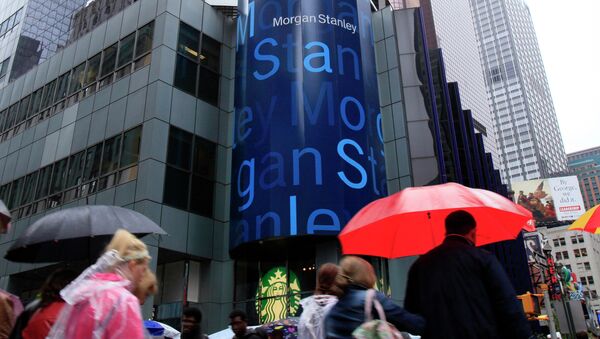Kristian Rouz – Analysts at US investment bank Morgan Stanley say China is poised to increase its leverage despite Beijing's recent efforts to curb debt accumulation. Experts say the so-called “shadow banking”, or unofficial corporate lending practices, are now less of a threat due to improved regulations and banking sector transparency.
According to a new report from Morgan Stanley, China's debt-to-GDP ratio is set to increase by 3-4 percent over the coming 12 months. Analysts said that although Beijing has taken steps to reduce its reliance on debt, last year's trade tensions with the US, and the lingering threat of a trade war, are making Chinese provincial governments and corporations more inclined to borrow money to finance their projects.
READ MORE: China Social Credit System Blocks Millions from Public Services
However, Morgan Stanley said Beijing has made significant progress to improve its risk-management.
According to various estimates, China's total unofficial debt-to-GDP, which includes debt of corporations and provincial governments, stands at roughly 300 percent. Morgan Stanley experts say this burden of debt, although still posing risks to the sustainability of China's economy, is now much less of a concern for international investors.
"This time, it's a bit different because they are using more manageable or transparent leverage rather than re-opening shadow banking”, Robin Xing of Morgan Stanley said in an interview Saturday.
China's private companies had been borrowing from financial firms through largely unofficial channels during the years of recovery after the global financial crisis of 2009. “Shadow banking” reached its peak between 2013 and 2017, but now the fears posed by that practice are gradually subsiding.
The government in Beijing has loosened its monetary policies over the past two years by reducing its reserve ratio requirements (RRRs) for commercial banks – essentially allowing financial institutions to ramp up their loan issuance through transparent official channels, rather than through “shadow lending”.
“Chinese regulators are now trying to walk a fine line by allowing credit to flow back into the private sector without returning to the old pattern of rapid and unsustainable credit growth,” Nicholas Borst of Larkspur, Calif.-based Seafarer Capital Partners LLC said.
China has also taken other measures to support domestic lending, and its limited monetary stimulus is seen as having generally improved the health of the Chinese financial system.
"Despite the temporary increase in the debt-to-GDP ratio, it's much more manageable and transparent than 2013 to 2017, when shadow banking was surging”, Xing said.
Meanwhile, economists say China is set to pause its deleveraging efforts amid a cooling in global economic growth and weaker international demand for its products, as well as the threat of disruptions in global trade. Some say China's $34-trillion debt burden could decrease support for the nation's economic expansion, unless the anticipated trade deal with the US brings additional revenues to Chinese companies.
“Deleveraging is dead”, Alicia Garcia Herrero of Hong Kong-based Natixis SA said.
A recent report from the Chinese government revealed Chinese banks extended some $530 billion in new loans last month. On a positive note, experts believe most of this money flew into the corporate sector to support manufacturing activity, and prop up the nation's productive forces.
However, the future of accommodative policies, China's debt, and economic growth largely depend on the outcome of trade talks with the US. A free trade deal is expected to boost China's exports, while also increasing its imports form the US, creating additional revenues for the nation's firms, and bringing down costs within the economy.
The talks, meanwhile, are expected to continue at a meeting between US President Donald Trump and his Chinese counterpart Xi Jinping in the coming weeks.





